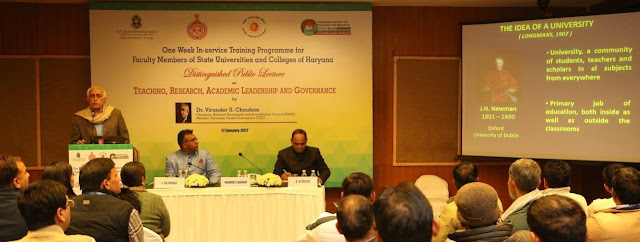JGU conducts Faculty Development Programme for Haryana University Teachers
Experts discussed the roadmap for quality higher education in India


To put things in perspective for the weeklong long training programme, a distinguished public lecture by Prof. (Dr.) Virander S. Chauhan, Chairman, National Assessment and Accreditation Council (NAAC) & Member, University Grants Commission (UGC), was also organised on January, 17, 2016 at the India Habitat Centre. The deliberations served as precursor to the weeklong training programme.
In his opening remarks, Prof. (Dr.) C. Raj Kumar, Founding Vice-Chancellor, JGU, said, “Teacher training in our country has evolved over time based on the recommendations of various committees on education development. A year ago, when we were working on the State Higher Education Plan for Haryana, we found that teachers in Haryana are still grappling with several issues when it comes to their exposure to national and international standards academia. To make reflective best practices the key pillars of teacher’s education in the state, we decided to come up with this dedicated week-long faculty development workshop. Our university, which serves as a role model for institutional excellence and is committed to contribute to capacity building for the teaching and learning ecosystem, is happy to host the first-of-its-kind in-service teacher training workshop to be held in a private university campus in the state.”
Dr.Virander S. Chauhan, Chairman, National Assessment and Accreditation Council (NAAC) & Member, University Grants Commission (UGC), a scholar of repute and an academic statesman and policy maker, in his distinguished public lecture’ said, “Universities, if they focus meaningfully on the knowledge triangle of education, research, and innovation, can indeed multiply institutional prestige and economic growth. It is a common misconception that universities are the drivers of innovation. What we must actually do is to invest in the creation of quality human capital in all segments.”
Elaborating on the present challenges of the educational structure, Dr. Chauhan said “We must understand that the current crisis is not only economic, but also cultural and social. While access, equity and excellence remain continued challenges, government policies focusing on developing R&D infrastructure only in science and technology is also a problem. Given that subjects like social sciences, fine arts and humanities are profoundly linked to the welfare of the societies, this is indeed unfortunate. Another area of critical concern is the lack of mutually agreed aspects for faculty assessment and promotions and the poor indicative performance.
“While emphasis needs to be put on developing research capital for all streams and logical structuring of the accreditation and rating mechanisms such as the National Institutional Ranking Framework (NIRF), it is also true that there’s no point in judging people who are not prepared. Teachers must take their roles very seriously and indulge in self-learning and periodical assessments. Digital educational credits via MOOCs can be of good help here, but it will always remain as the supplementary model,” noted Dr. Chauhan.
Ms. Anamika Srivastava, Assistant Professor, Jindal Global Law School (JGLS) and chief faculty coordinator for the teacher training program who spoke about the significance of the faculty development workshop said, “Quality higher education, requires quality faculty members. However, quality of a faculty member is largely dependent on the quality of immediate institutional environment and the larger societal context. While there has been a history of faculty development efforts within the public sector under the UGC, the public-private collaborative effort in fostering quality in higher education can develop a legacy of constructive and meaningful academic heritage.”
The last day of the training programme was graced by the presence of Dr.Mahavir Singh, IAS, Principal Secretary, Department of Higher Education, Government of Haryana. He said, “It is very important to be particular about imparting knowledge, as it plays an important role in creating a responsible generation. The onus lies on teacher to create an equilibrium between society and its stakeholders to bring about a knowledge pool of responsible citizens who are an asset to a dynamic democracy like India.”. He also stressed about Haryana government’s long term commitment on such teachers training programs, and asked for detailed feedback on further improvements.
The In-service Training Program for the Faculty members witnessed participation of more than 30 government colleges across several districts of Haryana. Reputed academics and representatives of the IIHEd conducted deliberative sessions on ‘Teaching and Learning in Higher Education’, ‘Research and Social Impact’, ‘Knowledge Transfer and Collaborations’, ‘Academic Leadership, Governance and Quality in Higher Education’ amongst others.
Prominent resource persons of the program included Dr.Mousumi Mukherjee, Assistant Director, IIHEd and Prof. Rajeev Malhotra,Professor and Executive Director, Centre for Development and Finance, Jindal School of Government and Public Policy(JSGP).
These training workshops are part of the ‘State Higher Education Plan 2016’, a collaborative exercise of the Department of Higher Education, Haryana Government and IIHEd of Jindal University, which provides a blueprint for revamping Haryana’s higher education landscape.
